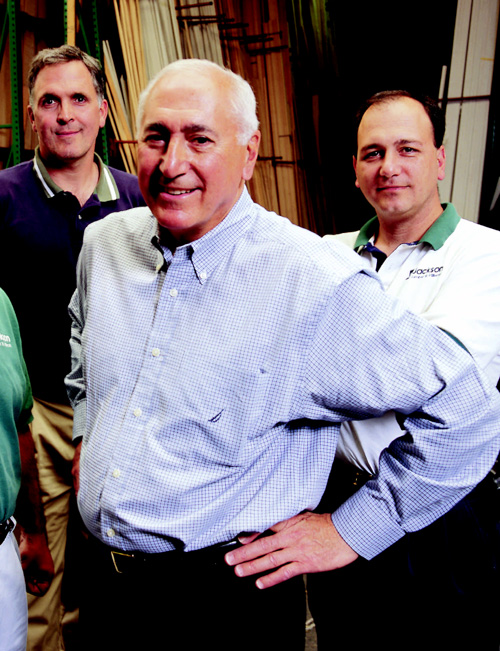History Repeats Itself Torrisi credits his father, Joseph, who passed away in 1996,with instilling in him this public service–oriented value system. “I have followed in his footsteps,” says Torrisi. “His business model, and now my business model, is ‘The community supported the company, so you need to support the community.’”
And while that support comes in many shapes and sizes—from local charities and community groups to LBM industry associations—there is always one constant:a personal commitment to every cause. “Al has picked up where his father left off and gone even further,” says Joe Pappalardo, general manager and owner of J.P. Realty, a Methuen, Mass.–based commercial developer and home builder that is one of Jackson Lumber’s oldest customers. “He’s very civic-minded and he goes out of his way to become involved [in the community] in many ways,” he adds.
“My philosophy is to be involved, to be high-energy, and then to pass it along to somebody else,” Torrisi confirms. “At some organizations, people stay for 20 or 30 years, and it becomes like their organization. I try to move around because it’s important for the next generation to get involved.”
It’s not unusual for that next generation to include Torrisi’s four children. For example, his daughter Lisa, who is a sales representative for a printing company, took over as chair of the Essex Art Center auction this year, while his son David, who recently became an attorney, serves the community as a Massachusetts state representative.
“It’s a challenge to try to replicate the person who was ahead of you,” says Mark Torrisi of his father. “Al definitely has a strong personality, and all of his kids have bits and pieces of it. We each realize that, and we [become active in organizations] that we are comfortable with.” Rising to that challenge has many rewards, adds Jay Torrisi. “You get yourself exposed to other people and other companies that do things differently, and it helps to bring new ideas to the table.”
It also can provide a level of economic support when the business climate becomes turbulent. “By supporting the community, it has helped to bring home the point that when times are tough the people in the community will help to support you,” says Mark Torrisi. “They want to support the people that support them; it goes hand-in-hand.”
Only the Strong Survive Jay and Mark Torrisi have experienced this synergy first-hand. They both joined the business at the tail end of the 1989–1992 recession, which was one of the worst in U.S. history and sent New England into a wrenching “downward economic spiral,” says Al Torrisi. “Those of us in the construction industry were severely impacted. Between 1989 and 1993,over 25 percent of the lumber-yards in Massachusetts went out of business.”
Jackson Lumber was able to weather and rebound from the economic storm, but not without downsizing and taking some hard blows to its operations, which proved testament to the mantra that “only the strong survive.” And that strength, in part, came from its close community ties, a loyal employee base, and 40 years of growth that helped establish Jackson Lumber as a solid LBM supply source in and around Lawrence.
From its founding in 1946 into the 1980s, Joseph Torrisi, a Lawrence native who was educated in the building trades, grew Jackson Lumber steadily from a small 15,000-square-foot startup location with five employees on Jackson Street to a full-service retail lumberyard and millwork operation.
By the time Al Torrisi joined the family business in 1963, after graduating from the University of Notre Dame, Jackson Lumber had grown to 25 employees and acquired land one mile away on Market Street to build a warehouse. Shortly thereafter, the company expanded the Market Street location by acquiring a defunct textile building adjacent to the property and renovating it into the company’s new headquarters, including a showroom and office space. The original warehouse (which was built in 1950) also was torn down to allow the company to invest in building a rental property that was initially leased by a supermarket.
At that time, Jackson’s customer mix was 50 percent pro, 30 percent retail, and 20 percent industrial/commercial business. “We were an all-purpose lumber and building materials yard selling to all types of customers,” says Al Torrisi, who became president of the company in 1982 after buying out his father and other family members.“ At that time, we had one of the most modern showrooms [in New England], and we had the first drive-through yard in the Northeast. We were ahead of our time.”
Business boomed through the late ’60s, ’70s, and early ’80s, and in 1985 the mill-work operation, including 40 employees and all manufacturing of windows, doors, and specialty products,was moved to a new facility in nearby Salem, N.H. Then, in 1988, the second tenant of the original supermarket building (a department of motor vehicles) left, and Jackson Lumber turned it into a kitchen and bath design center.
Unfortunately, these expansions marked the crescendo of a golden era. Within five years, the recession had taken a heavy toll, and Jackson Lumber found itself in survival mode, faced with reorganizing and down-sizing all of its operations just to keep the doors open. “When 1991 came, we could no longer afford two locations,” Al Torrisi recalls. “We couldn’t keep everybody, so we decided to close down the business in Salem. We reduced our costs. We cut our personnel almost in half from ’89 to ’92;we had 170 people, and by the beginning of ’93 we had 85.”
But Jackson’s remaining employees stood behind the company and helped to pull it through the worst of the economic downturn. “The people who were left behind took pay cuts anywhere from 10 percent to 25 percent, and they made financial sacrifices personally,” Torrisi continues. “We were able to keep them because we cut every expense known to man and we were able to survive.”
Striking a deal with those employees who remained, Jackson Lumber upheld its philosophy of giving back and promised to institute an aggressive profit-sharing plan if the company pulled through. True to its word, that program has now been in place for 10 years and paid employees more than $3.5 million. “You have to balance your life with business and giving back to the community,” says Torrisi of his dual commitment to both profits and people. “Of course, the company has to be your priority. … When the economy and our company were hurting 11 to 12 years ago, our donations and support just about dried up,” he adds. “You cannot donate time, resources, and money unless you have a company that is successful.”
Today, that spirit of mutual support pervades through Jackson Lumber’s employee base, which includes upwards of 15 family groups of two to four related people. “This is a family-run business, but [Al Torrisi] makes us feel like we are all part of the family,” sums up Pat Marcotte, marketing manager. “It’s not just a job, it’s a family, and we all work together.”



